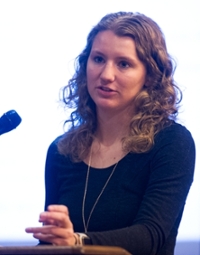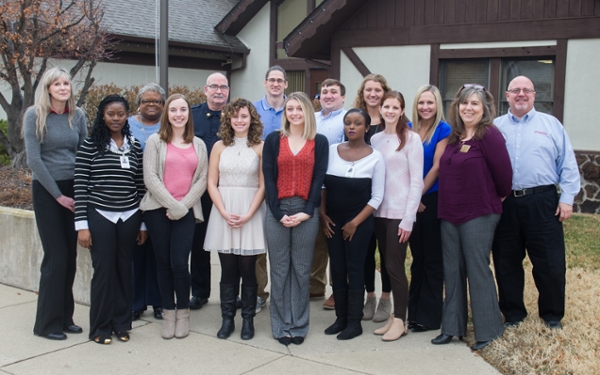 An awareness and educational program to prevent opioid abuse in the schools was one aspect of a presentation that Southern Illinois University Edwardsville’s School of Nursing (SON) students gave to City of Highland representatives to help the town combat the drug crisis.
An awareness and educational program to prevent opioid abuse in the schools was one aspect of a presentation that Southern Illinois University Edwardsville’s School of Nursing (SON) students gave to City of Highland representatives to help the town combat the drug crisis.
Ten students from the Care of Populations clinical groups of Charlotte Chance, DNP, clinical assistant professor, presented “The Opioid Epidemic: Community Engagement and Awareness” on Feb. 21 at Highland City Hall.
The students’ presentation was the second in a series of SIUE’s Successful Communities Collaborative (SSCC) initiative with Highland, a town of approximately10, 000 people.
“The opioid crisis is real. There isn’t a single community immune to it, and to that end, we have an obligation to do something about it,” said Lisa Peck, Highland assistant city manager. “When SIUE asked us what we wanted to partner on, I thought here is our opportunity to be on the forefront of addressing the opioid problem. By Highland coming forward and acknowledging that we are actively dealing with the issue, hopefully other communities will begin to act progressively to address this harrowing issue.”
A growing number of overdose deaths occur in the U.S. every day due to opioid addiction, reported SON senior Shannon McGinnis, in her portion of the presentation.
 “It’s vital to be aware of the problem, so we can fix it,” McGinnis said. “It’s important to get information into the school to educate children and prevent the problem before it starts. We found in our research that the age of children who start using drugs is 13.”
“It’s vital to be aware of the problem, so we can fix it,” McGinnis said. “It’s important to get information into the school to educate children and prevent the problem before it starts. We found in our research that the age of children who start using drugs is 13.”
The SSCC opioid education and prevention project in Highland will target teens, ages 14-18, according to Chance.
“The overall purpose of the project for the second student cohort was to build on the needs assessment conducted in fall 2017, and identify references, resources, and tools using best practices for drug use prevention and supporting families with addicted members,” added Chance.
Emergency Medical Services Chief Brian Wilson is one of many town officials and representatives working in the fight against the opioid epidemic in Highland and surrounding cities. Wilson’s daughter is now drug-free from a long battle she had with drug and opioid abuse.
“In the last two years, we have administered NARCAN 33 and 32 times in 2016 and 2017, respectively in the Highland area (approximately 30,000 people),” said Wilson. “That is an average of us administering it once every 11 days.” As of Feb. 21, 2018, Wilson said he had used NARCAN, which is an opioid antagonist, in the Highland area seven times, for an average of once every 7.28 days.
“When we see a crisis, and this is a crisis, we want to try and help either the users, the families or both,” said Wilson. “When you have an addict in a family, the ripple effect is felt throughout the entire family. We want to get the addict the resources to get well. We also want to help the family find resources to cope.”
In reflecting on his family’s struggle with opioid use, Wilson said, “Probably the biggest hurdle we faced was the enabling part. Many times you confuse loving your child and trying to help your child with enabling them.”
“It’s extremely tough to draw those lines,” he continued. “At some point the addict has to realize that their recovery rests with them, but we as a family and community are here when they are ready.”
SSCC is a yearlong partnership between SIUE and a regional community. The community partner identifies sustainability and livability projects that would benefit from SIUE expertise. Faculty from across the University incorporate these projects into their courses, and engage graduate and upper-level undergraduate students in the projects, reported Tim Engelman, SSCC program director and associate director of Educational Outreach.
SIUE’s Successful Communities Collaborative initiative is fashioned after the Educational Partnerships for Innovation in Communities (EPIC) model created in 2009 by the University of Oregon. The University joined EPIC, a network of more than 30 colleges and universities in March 2017.
Photos:
SIUE School of Nursing senior Shannon McGinnis delivers her portion of the presentation, “The Opioid Epidemic: Community Engagement and Awareness” Highland representatives.
Some of those working on the addressing the opioid epidemic in the City of Highland are (left-right) Lisa Peck (Highland Assistant City Manager), Ivy Kusi, Charlotte Chance (Clinical Assistant Professor in the SIUE School of Nursing) Jessica Kearns, Chief Brian Wilson (EMS), Brianna Cox, Jared Galeener, Morgan Nason, Mick Straub, Shatara Ellis, Shannon McGinnis, Emily Gabbard, Taylor Dunnette, Connie Frey-Spurlock (SIUE Successful Communities Collaborative faculty director and associate professor in the Department of Sociology) and Tim Engelman (SIUE Successful Communities Collaborative – SSCC-- program director and associate director of Educational Outreach). All students are seniors in the SIUE School of Nursing (SON).